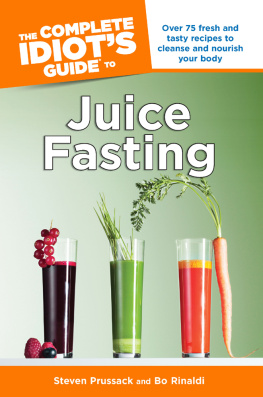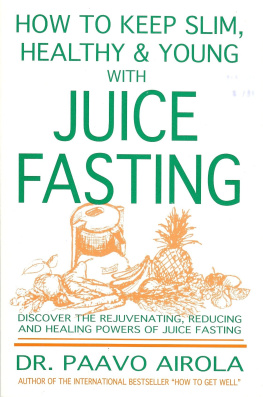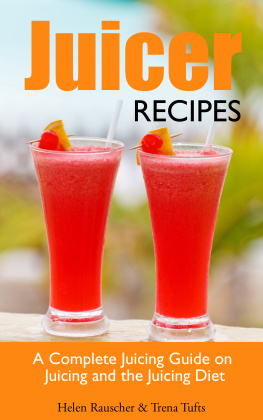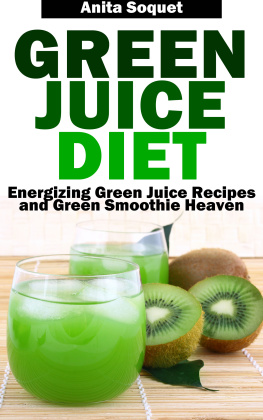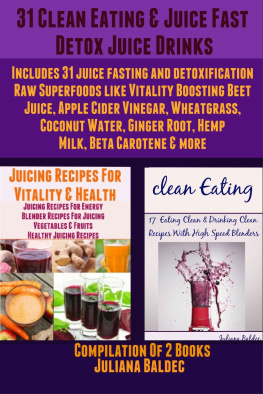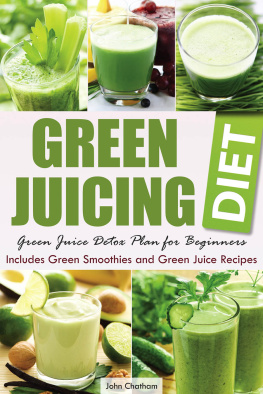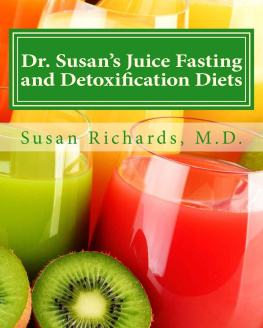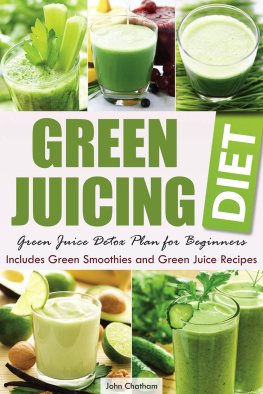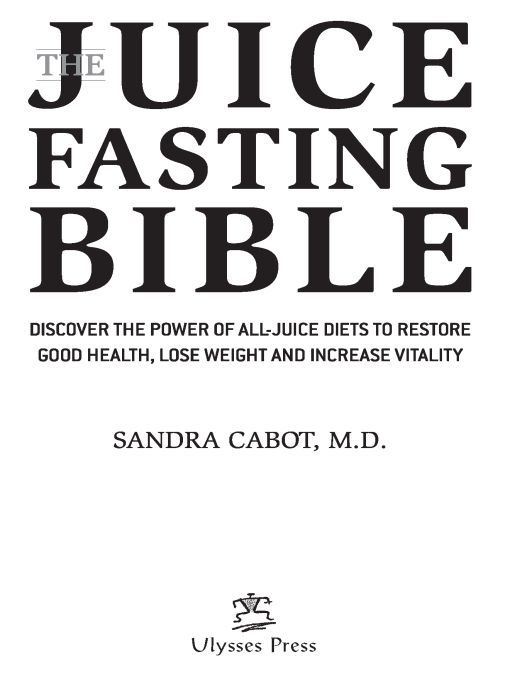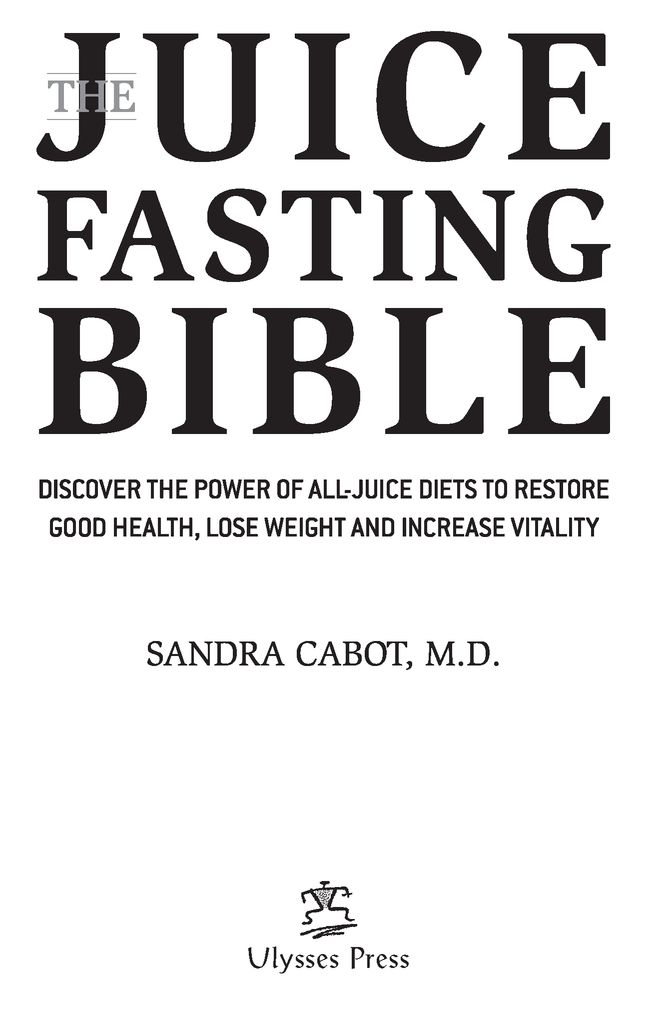Table of Contents
This book is dedicated to the passionate and knowledgeable group of people who work with me in my head office in Phoenix, Arizona. They are true professionals, always ready to talk to our clients who seek advice regarding their health. They have been with me for many years, and without their help I could not spread the message of the amazing power of nutritional medicine.
Benefits of a Juice Fast
Really, is there anyone who doesnt love a glass of freshly squeezed juice? Or, if you think love is too strong a word, perhaps enjoy is more your style? Either way, we could be talking about any kind of juiceorange or apple, grapefruit or mango, pineapple or tomato. Its a matter of personal taste and preference, since the list is quite extensiveand becomes even more so if you count vegetable juices as well. But well get to that in a while.
For now, lets just relish the thought of what it means to drink a glass of our favorite juice. In my case, its usually a combination of several juices, which I often rotate from day to day, for variety. First off, juice is flavorfulthats its very essence. Few things please the tongue more. A glass of juice also refreshes us, in a way that colas or one of the many trendy energy drinks could never be. Is it possible that our bodiesunlike our mindsarent fooled by mega-million-dollar ad campaigns?
Fresh juices are also bursting with all kinds of healthy ingredients: antioxidant vitamins, natural antibiotics, enough beneficial nutrients to stock a health-food store, and anti-inflammatory substances that protect your bodys cells as well as reduce pain. Juices even contain enzymes that can improve your digestion and cure some intestinal diseases.
So, if something tastes good and is good for youand its also easy to obtain and usually quite affordablecan you think of any good reason not to drink plenty of juice? I doubt that you can. But, as you may have gathered from the title of this book, we actually are talking about more here than merely drinking an occasional glass of juice. Rather, were talking about living for a period of days, or even weeks, on nothing but raw, fresh juice.
Now, while the idea of drinking juiceeven a lot of itappeals to most people, the idea of fasting, even with juices, may not. Id say that love is a word few people would ever associate with fasting, and for the vast majority of us I would imagine that the same holds true for enjoy. Fasting, as far as most people are concerned, conjures up less-than-pleasant images, such as deprivation, exhaustion, cravings, and a gnawing hunger inside. That sort of feeling, frankly, is quite understandablewith much of the blame falling squarely in the lap of the media, which tell us (or, more often, dont tell us!) the truth about fastings benefits.
Trace Fasting to Its Natural Roots
By definition, fasting is the voluntary abstinence from solid foods over any length of time. Its a practice that dates back to at least the early days of Christianity and other religions, when it was seen as a way for a believer to purify the soul and prepare to receive atonement for sins. That belief and practice still exists today in some religions. But over the centuries fasting has also been adopted by a wide range of people in an even wider range of cultures, as a desirable way to cleanse the body, calm the soul, and heal the mind. Fasting can be a wonderful thing, as long as its done properly and not abused.
These days, the only time you will read about fasting in the press, or see it featured in a television news report, might be when a political figure or a political prisoner (self-proclaimed or otherwise) wants to make a statement by starving himself or herself to death, or at least near-death. I believe that this is one of the reasons that many people have a negative image of fasting in general, without really knowing much about it.
A general lack of acceptance by the mainstream medical community has likewise damaged fastings reputation. This ignorance (for what else can you call it?) has always puzzled me, because many of these same doctors have used fastings basic concepts to create an often-evil cousin: dieting. If done properly, fasting always works. As for the overall success rate of dietingwell, you be the judge.
Ordinarily, contemporary dieticians and newspaper and television journalists have been conventionally trained to the standards of the day, and have not been exposed to the clinical practice of nutritional medicine to the same depth and breadth as I have been. So it comes as no surprise that many of the fasting articles or detoxing stories we might read in the popular press these days are negative, condescending, sensationalistic, or cynical. Well, let me tell you, the health-care providers mentioned in those stories have usually not treated patients as sick as those Ive helped, nor have they witnessed the power of juice fasting as I have done.
Its true that a deep-seated fear of hunger turns many people off to the possibility of fasting, as well as to its benefits. Its a sad fact that in todays world, large numbers of people have serious food addictions. The evidence is all around us, from food-industry advertisements, to the waiting rooms of doctors offices, to the long lines and even drive-through lanes at fast-food restaurants. Its a hard fact, but a true one, that few addicts would willingly part with their drug of choice, which in this case is poor-quality food.
My hope, however, is that after you read this book and learn the truth about juice fasting and its extraordinary benefits, then you will become as convinced as I am that there is no better way to improve your overall healthand your quality of life. Part of the beauty of what you are about to discover is that you can begin your journey to better health doing something as simple, and as delicious, as drinking a glass of your favorite juice.
Avoid Digging Your Own Grave
Whoever came up with the old saying that You are what you eat was definitely on to something. This makes it all the more tragic that the vast majority of people in the United States and other developed nations ignore this powerful bit of folk wisdom. And that tragedy has been compounded over the past generation or so, as more and more scientific evidence has shown that many of the most common, and potentially fatal, diseases are directly related to our eating habits.
I suggest a better paraphrase: You are what you eatand what you eat just might kill you. I also like the expression, The way many people eat today, theyre digging their own grave with their teeth.
The average Americans diet features absurdly large amounts of refined and processed foods, heavy with trans fats and sugar and practically oozing chemical additives and preservatives. Most commercially raised meatsbeef, chicken, and porkalso contain a smorgasbord of additives, which range from growth hormones to antibiotics. And as if this werent enough to send your body and its elimination systems into overload, imagine the added effect of excess alcohol, caffeine, and nicotine (including secondhand smoke), not to mention polluted air. Then, lets not forget all the pesticides and herbicides and other chemicals that are sprayed on most of our orchards and fields and vineyards, to say nothing about all the plastics that are ubiquitous in our lives. Our waterways become filled with chemicals from plastics, dyes, and even drugs prescribed for people that get improperly flushed down the toilet or are eliminated in their urine.


